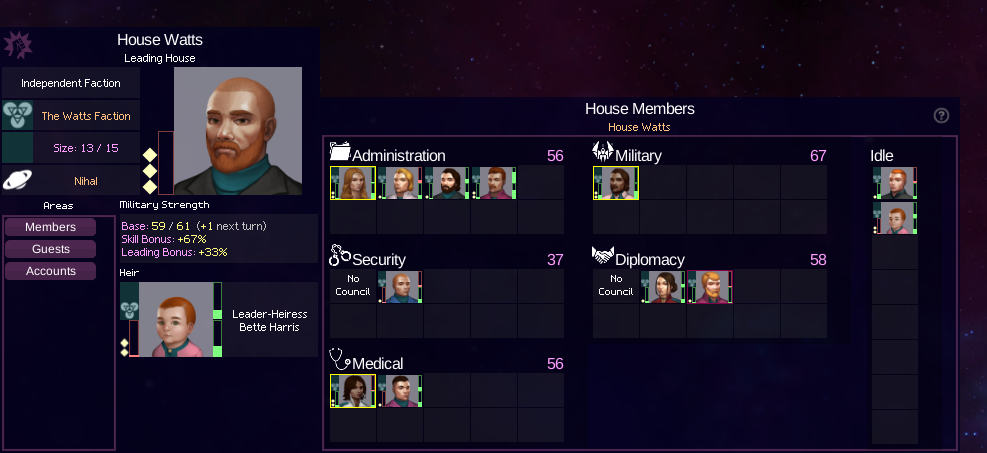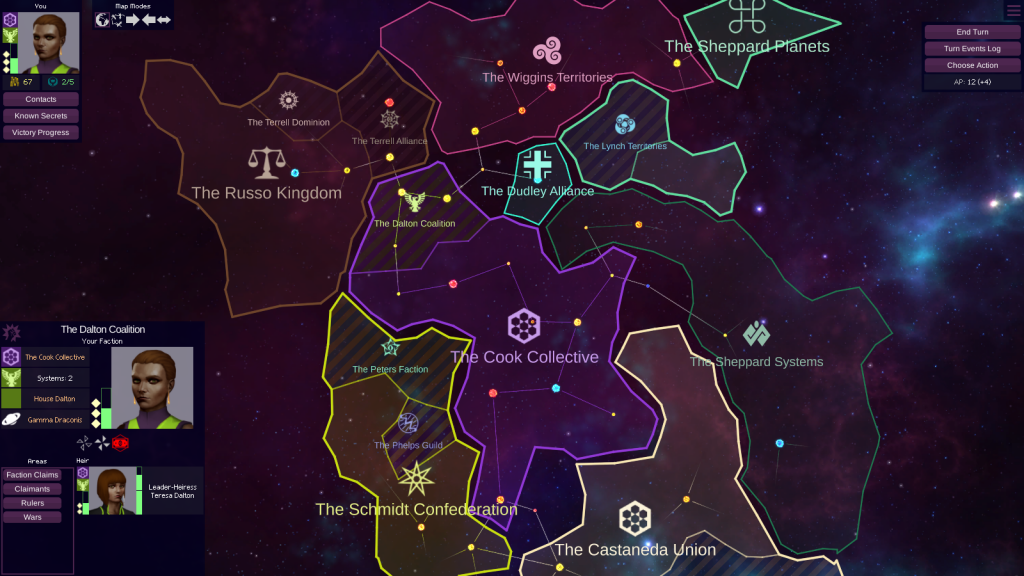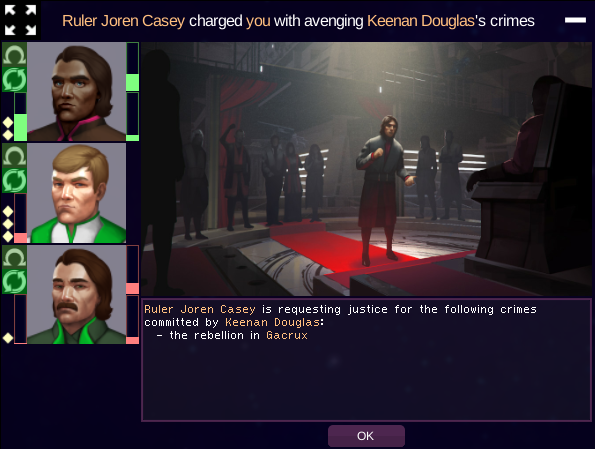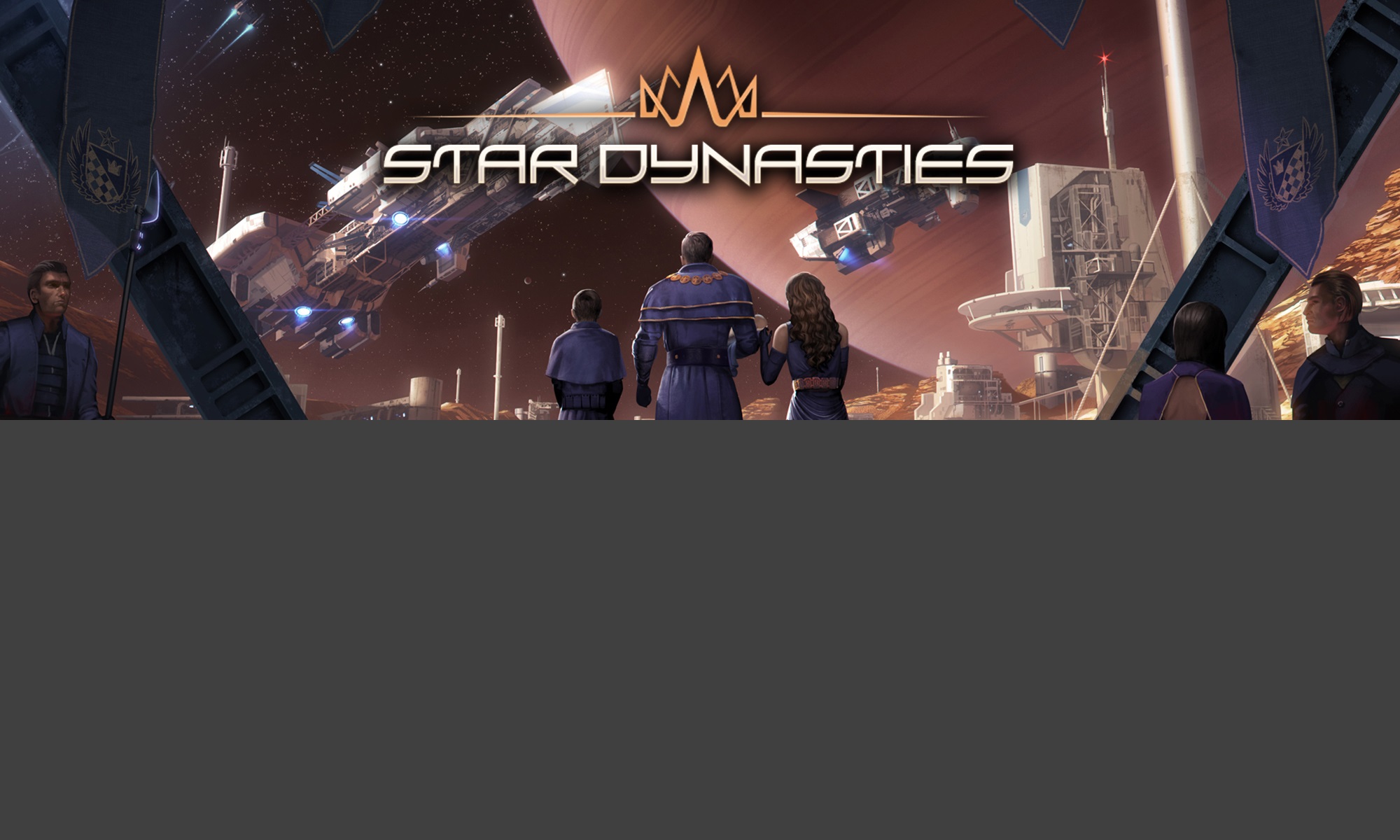In this post, I will describe the political structure of the galaxy. The game has matured in this area recently, so it’s good to outline the big picture.
Background
First, a quick refresher on the background. In the 22nd century humanity had a foothold in the stars, but the inadvertent destruction of Earth has plunged the galaxy into a new dark age. In the years since the Collapse, there has been the near total loss of the political, technological, and economic advances of human civilization. The initial focus of the colonies, never intended to be self-sufficient, was simply survival. Disconnection of the lifeline of resources from Earth wiped out many, and the survivors faced a most desperate enemy – each other. The ensuing lawlessness shattered the old political structure and led to the rise of warlords and a brutal cycle of subsistence and war. Several hundred years later the colonies have stabilised into a simple feudal society. An aristocratic elite fight between themselves for the right to rule over the scattered fragments of human kind.
Houses
This elite population is organized into houses, typically consisting of an extended family and their more trusted servants. Houses are headed by an autocratic patriarch or matriarch that wields its power absolutely. This power usually comes from its exclusive control of parts of a colony. For example, a wealthy house may control a shaft in a mining base, or one of the hydroponic farms that feeds a system. Houses formed out of the gangs that arose initially after the Collapse to seize and control colony resources, and which have now matured to become the backbone of the political structure. To be anyone of any consequence you must be a member of a house. Membership is hereditary, although houses will sometimes adopt new members from junior houses or the peasant population when they need more henchmen.

Usually, the most powerful house in a colony has established itself as its overall ruler, and maintains order and dominance through a mix of political manoeuvring and force. While weak rulers are sometimes overthrown, ruling houses that maintain their position for many years come to be seen as the legitimate source of order in a colony. Over multiple generations, this social order has stabilised and developed its own customs, martial rituals, and obligations. The most important of these is that each house is expected to participate in the defence of the colony by maintaining a military force that can be called upon by the ruler. Houses rarely need any encouragement to do so, as defenceless ones tend to be taken advantage of by their more martial peers.
Factions
Some colonies group together into factions, led by their strongest ruler. These political relationships between colonies are more tenuous because of the distance between stars. A colony can be spread across multiple installations in a system but the travel time between these locations will still be hours at most. The jump between two systems takes several days, and this makes it impractical for any house to control territory on multiple stars with the same effectiveness. What has evolved over time are relationships of tribute, military service, and protection between strong rulers and their neighbours. These leaders can call upon the combined militaries of those that they have cajoled or threatened to belong to their faction, and use this combined military might to keep their faction’s rulers and other nearby leaders in check.
As this social structure has solidified, norms of obedience, loyalty, and acceptable behaviour between leaders and rulers have emerged. Leaders are seen as the legitimate heads of the status hierarchies of the galaxy, but those that abuse their position draw universal ire. Acts of tyranny make a leader vulnerable to rebellion from ambitious rulers. A leader’s faction persists beyond their death and its leadership is inherited by their children, a custom that avoids a lot of unnecessary bloodshed.

Leagues
The strongest leaders, called archons, establish master-subject relationships with other leaders. Leagues can form when a leader submits to another instead of risking annihilation. However they usually form when a faction simply grows too large to be managed by a single leader and the members of their house. Such leaders are forced to weaken their grip on their extended territory, breaking it up into separate factions and granting them to vassal leaders.
Archons that successfully maintain control over their league of factions occupy the shaky pinnacles of the galaxy’s power structure.
Custom and Law
Binding society together is a code of primitive ethics and law that has been adopted slowly over time. Unsurprisingly this largely serves the interests of the most powerful, who perpetuate the belief that they are the rightful wielders of power in the galaxy. However it provides good restrictions against general violence, by prohibiting military adventures without any justification and other destabilizing acts. Systems of hereditary rights have evolved at multiple levels; house, faction, system, and league. These help to provide continuity of ownership with minimal dispute and to reduce incentives for acquiring wealth through naked aggression.
An important institution is marriage, as both an avenue to acquire hereditary rights peacefully, and a mechanism of reducing violence and building alliances. As a consequence, divorce is widely frowned upon.
One area in which the powerful have had to bend is to fulfil the role of providing rough justice for their followers. Even a mighty archon will fall if they routinely ignore the valid grievances of their subjects.

If you would like to comment on this post, click here.
